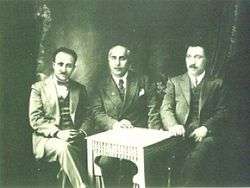Süreyya Bedir Khan
Süreyya Bedir Khan (1883, Constantinople-1938, Paris) was a Kurdish prince, a descendant of Bedir Khan Beg and a member of the Bedir Khan family.

Early life and education
He was born into the noble Kurdish family of the Bedir Khans, as the son of Emin Ali Bedir Khan and his first wife. His mother died as he was still a child, in 1887. He attended the Galatasaray High school in Constantinople until 1906, as he had to abandon his studies when he and other male members of the Bedirkhan family were sent into exile to Isparta,[1] after his uncle Ali Şamil Bedir Khan was accused of being involved in the murder of the mayor of Constantinople, Rıdvan Pasha.[2]
Political and journalistic career
He came back to Constantinople in 1908, where he began his journalistic career. From 1909 and 1912 he was a member of the Ottoman bureaucracy and governed municipalities in the Aydin and Beirut Vilayet. According to a British intelligence report, he was requested to enter the Ottoman Government by Enver Pasha in 1912, a demand he did not follow and concerned over reprisals, he left for Egypt. In Egypt he was welcomed by a community of exiled former Ottoman intellectuals and was given the task to take care of the estate of Nimetullah Hanim, a princess of the Khedivial family and daughter-in-law of Ahmed Muhtar Pasha.[1]In 1918 he established the Committee for the Independence of Kurdistan and onwards he reinitiated the publication of the Kürdistan newspaper[3] which originally was founded by his uncle Mikhdad Midhat Bedir Khan.[4] He also supported the Kurdish ambitions at the Paris Peace Conference, using his contacts to the diplomatic circles in Cairo, but did not personally attend the conference. From 1920 on, he mainly stayed in Egypt, after he was urged by the British to return from a short Syrian stay.[3] He established himself in the az-Zahir quarter in Cairo.[5] Other family members such as Zarife Bedir Khan, who was the wife of Arif Mardinzade, also lived in Cairo at the time,[6] and were joined by several others in March 1920 coming from Istanbul. They were accompanied by a spy of the Kemalists, who suspected Süreyya Bedir Khan of having much influence with the British diplomatic community. The spy later threatened the Bedirkhan family after it was found out what she was doing.[7] After the Xoybûn was founded in Beirut in 1927, he became its local representative in Cairo,[8] and together with his brothers Kamuran and Celadet Bedir Khan was a leader of the organization.[9] and attempted to support the Ararat rebellion through in 1929, after the Turkish Government decided to strip him of his Ottoman passport in 1928, he successfully applied for the Syrian citizenship, alleging that we was born in Maqtala, a claim that was refuted by the French in 1933.[10] In 1931, he settled in Paris, where he established relations with the Greek and Armenian intellectual community and lived in an apartment in the Rue de Sèvres. He lived in Paris until his death in 1938.[11]
References
- Henning, Barbara (2018-04-03). Narratives of the History of the Ottoman-Kurdish Bedirhani Family in Imperial and Post-Imperial Contexts: Continuities and Changes. University of Bamberg Press. pp. 354–355. ISBN 978-3-86309-551-2.
- Özoğlu, Hakan (2004-02-12). Kurdish Notables and the Ottoman State: Evolving Identities, Competing Loyalties, and Shifting Boundaries. SUNY Press. p. 95. ISBN 978-0-7914-5993-5.
- Henning, Barbara (2018-04-03), p.357
- Meiselas, Susan (1997). Kurdistan: In the Shadow of History. Random House. p. 56. ISBN 0679423893.CS1 maint: date and year (link)
- Henning, Barbara (2018-04-03), p.357–378
- Henning, Barbara (2018-04-03), p.358
- Henning, Barbara (2018-04-03), pp.360–361
- Henning, Barbara (2018-04-03), p.361
- Jwaideh, Wadie (2006-06-19). The Kurdish National Movement: Its Origins and Development. Syracuse University Press. p. 25. ISBN 978-0-8156-3093-7.CS1 maint: date and year (link)
- Henning, Barbara (2018-04-03), p.362
- Henning, Barbara (2018-04-03), p.363